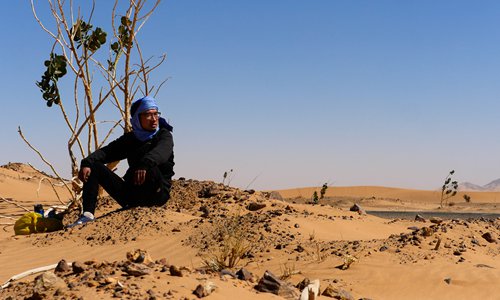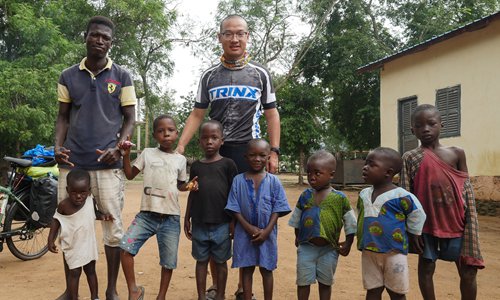
From the People's Daily app.
This is Story in the Story.
Now in its seventh year, the Summit of the Forum on China-Africa Cooperation (FOCAC), hosted annually in Beijing, focuses on political and economic cooperation.
As China continues to intensify efforts on enhancing the cultural dimension of relations with their African partners, today there are over 70 Confucius Institutes and classrooms across the continent.
The first Confucius Institute in Africa opened in December 2005 at the University of Nairobi in Kenya.
“Cultural exchanges are crucial for Chinese and African people to understand each other and for the two sides to further consolidate their relations,” David Monyae, co-director of the Confucius Institute at University of Johannesburg, South Africa, told Xinhua in an interview in July 2018.
“People-to-people exchanges should be a priority in China-Africa relations since the two sides need to better understand each other's culture, history, and even law. There’s a growing interest among the African youths to know more about China,” Monyae said, explaining the significant jump in the numbers of Chinese cultural centers in the continent.
The Confucius Institute program began in 2004 and is overseen by the Office of Chinese Language Council International, also known as Hanban.
According to China’s Ministry of Foreign Affairs, the purpose is to strengthen educational and cultural exchanges and cooperation between China and other countries and enhancing mutual understanding and friendship between their peoples.
In today’s “Story in a Story,” we take a look at how one Chinese teacher at a Confucious Insititute in Africa became inspired to hop on his bike and travel thousands of miles to his home in China in an effort to raise money for the small town in the country of Benin, West Africa.

Yuan Jianglei takes a rest in the desert of Mauritania in January 2017. (Photo: Global Times)
For Yuan Jianglei, two years as a volunteer Chinese teacher at Benin's Confucius Institute wasn't enough time for him to explore Africa.
In 2016, he hopped on a bicycle and pedaled from Benin to China.
In just under one year, and traveling almost 10,000 miles through 16 countries, he safely arrived in Xinjiang.
The journey helped him raise enough money to help a village in Benin to drill a well and install a solar power station.
After graduating from Chongqing Jiaotong University in 2014, Yuan applied to become a teacher at the Confucius Institute in the University of Abomey-Calavi, Benin, in West Africa.
According to the United Nations Development Program, as of 2014, roughly 70 percent of Benin’s residents had access to potable water.
In rural areas, the lack of safe drinking water has resulted in cholera outbreaks among children.
Without financial resources, he contacted local companies to make a bet with him - if he could successfully cycle back to China from Africa, the company would make a donation to the village to help the locals build a well and a solar power station.

Yuan Jianglei poses with local kids in a village in Togo in September 2016. (Photo: Global Times/Courtesy of Yuan Jianglei.)
In the beginning, nobody answered Yuan's request.
"They probably thought this young man would die on the way," he said in a recent interview.
Before setting off on the journey, he carefully mapped out a course. He figured out the visa requirements of each country he planned to travel through, set a budget, and decided on which daily necessities he would need.
With a camera, necessary provisions and several thousand dollars, Yuan hit the road.
While in Togo, he received a call from a Chinese company that exported motorcycles to Africa and said they were interested in his project.
Yuan explained they didn't have to donate much, just one dollar for every kilometer he traveled, and the company agreed.
"To be honest, charity wasn't the only reason I did the cycling tour. It was a natural thing that occurred on my trip," he told the Global Times.
During the trip, apart from sleeping in his own tent, he often lived in the homes of villagers or travel buddies.
Yuan said his French with an African accent, which he attained during his two years in Benin, was a big help.
"A lot of villagers in West Africa, after hearing my accent, would invite me to have dinner and sleep in their homes," he said.
In Burkina Faso, Yuan was stricken with malaria.
"It was late at night and I slept in a straw shed. The next day, I suffered from vomiting and diarrhea and felt cold all over my body."
He called a friend and was sent to the hospital. After minor treatment and some rest, he hit the road again.
In March, about six months after his journey, with the $16,000 donation from the Chinese company, Yuan went to Benin again to fulfill his promise.
A well over 70 meters deep has since been drilled in Nipouni, and workers are building a solar power station that will be able to fulfill the electricity needs of five villages in the region.
"Is Africa wild? Is Africa poor? Is Africa happy? I wasn't sure. I choose to hit the road myself to feel Africa with my own eyes and my heart," he said in a trailer of his upcoming documentary.
(Produced by Nancy Yan Xu, Lance Crayon and Raymond Mendoza. Music by: bensound.com. Text from China Daily and Xinhua.)


